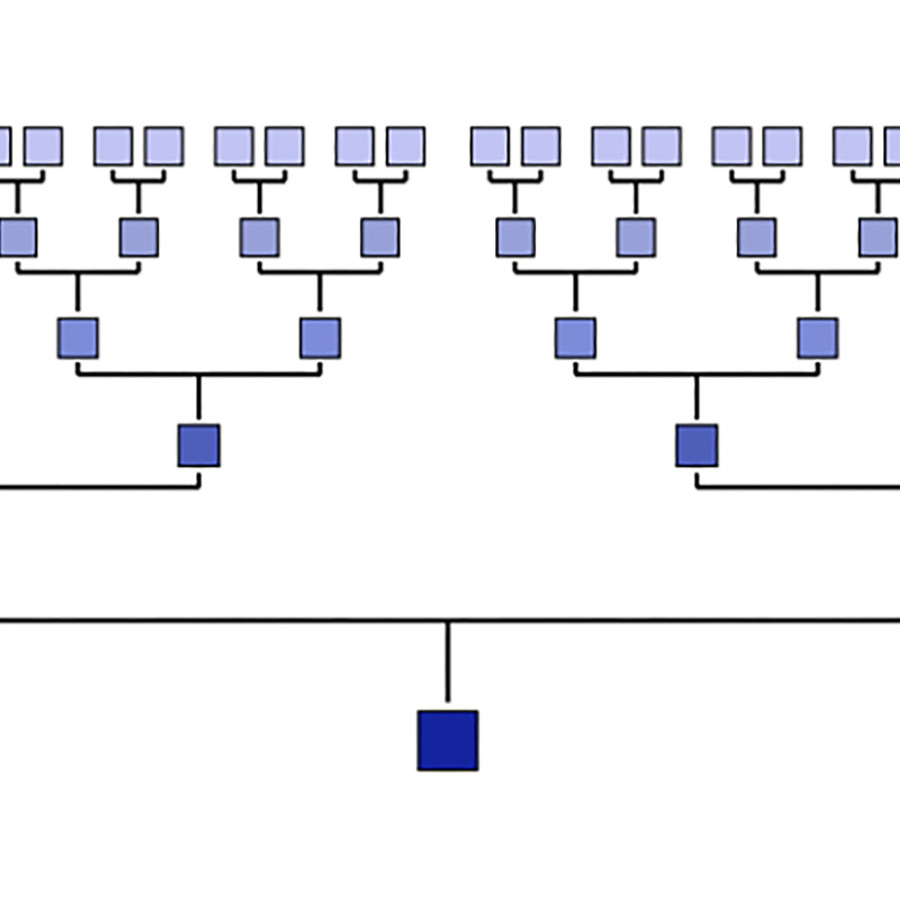
What are the odds of inheriting no DNA from a great, great, great grandparent?
December 7, 2011

- Related Topics:
- Common questions,
- Genetic genealogy,
- Recombination,
- Ancestry,
- Relatedness,
- Editor's choice
A curious adult from Canada asks:
“What are the odds of inheriting no DNA from a great, great, great grandparent?”
Editor’s note (3/15/21): Some of the probabilities in this article have been updated, with more information about the source and/or math included at the end.
This is a great question and probably one that a lot of people are curious about. The quick answer is that the odds are pretty close to 100% that you have some DNA from all of your great, great, great grandparents.
DNA is passed down to the next generation in big chunks called chromosomes. Every generation, each parent passes half their chromosomes to their child. If that’s all there was to it, there would be around a 1 in 4 chance that you would get no DNA from a great, great, great grandparent.*
What most people forget, though, is that our chromosomes get mixed and matched before they are passed on. It is because of this recombination that your great, great, great grandparent's DNA is almost certainly still lurking in yours.
In fact, there’s only about a 0.01% chance of you inheriting no DNA from a great, great, great grandparent.†
Mixing DNA Keeps You Connected
Most people have 23 pairs of chromosomes for a total of 46. One of each pair comes from mom and the other from dad. This is why we are 50% related to our moms and 50% to our dads.
Of course our parents got their chromosomes from their parents. This is why you are about 25% related to each grandparent.
If this is all there were to passing on our DNA, then this is what a typical couple of generations might look like:

At first this picture might seem a bit overwhelming but it isn't really. Each grandparent's chromosomes are a different color.
Mom ended up with half of one parent's DNA and half from the other (half green and half light blue). Same thing with dad, except he ended up with half red and half dark blue in our picture.
When mom and dad have you, you get a mix of their chromosomes, which are a mix of their parent's chromosomes. So you have green, red, light blue and dark blue chromosomes.
If this was all that was going on, then there could be a small chance you wouldn't be related to your grandparents. All that would have to happen is something like this:

As you can see, by chance you happened to not get any light green chromosomes. You are totally unrelated to your maternal grandpa!
The odds of something like this happening would be very small… something like 1 in 8.4 million. It is the same odds as flipping a coin 23 times and getting all heads.
In fact, the two problems are similar. For a coin, on each flip you can get a head or a tail. For chromosomes, each generation you can get one from grandma or one from grandpa.
If we were to keep playing this game, what would the odds be that you'd get no DNA from one of your great, great, great grandparents? It would be about 1 in 4.*
This is not reality though. What really happens is that DNA is swapped between the two chromosomes in each pair before it is passed down. A single generation actually looks like this:

You didn't get any whole chromosomes from either grandparent. Each chromosome from mom has some DNA from her mom and some from her dad. Same thing with the chromosomes your dad gave you.
This means you don't end up with a 50% chance for a blue and a 50% chance for a red chromosome from dad. Or a 50% chance for a light blue and a 50% chance for a green chromosome from mom.
Instead you get a chromosome that is about half red and half blue from dad and one that is half green and half light blue from mom. And as you can see in the picture, this happens for each of your 23 chromosomes.
This DNA swapping is called recombination, and it means that each chromosome you got from your parents is a mix of their parents' chromosomes. This means you will almost certainly get DNA from all of your grandparents.
And this holds true for later generations too. Here is how much DNA on average you'll share with each generation:
|
Generation |
Percent shared DNA |
|
Parents |
50% |
|
Grandparents |
25% |
|
Great-grandparents |
12.5% |
|
Great-great-grandparents |
6.25% |
|
Great-great-great-grandparents |
3.125% |
Because of recombination, you can't easily lose big chunks of distant relative's DNA. Instead it is slowly diluted away.
So on average you'll have about 3% of each of your great, great, great grandparent's DNA. There is a good chance it is a little more or less than this because the DNA swapping in recombination is pretty random. This means that sometimes you'll get a lot of the DNA from one chromosome in a pair and a little from the other.
But the odds of getting no DNA from a distant relative over 23 different chromosomes are very small. So small that you almost certainly have at least a bit of their DNA.
In fact, you have DNA from very distant ancestors. For example, scientists can still see Neanderthal DNA in people living today, and Neanderthals died out 30 thousand years ago!
Uniquely You
From all of this you might think that none of your DNA is unique… it all came from your ancestors. This isn't true. You have some of your very own DNA that none of your ancestors had.
Where'd this DNA come from? Not aliens or anything like that. No, they mostly came from mutations.
A mutation is a change in our DNA. It can happen because of environmental reasons like radiation, viruses or chemicals or because of a mistake when our DNA gets copied. Since these mutations change the DNA, it will change what we inherit from our parents.
Most of the time, these mutations have no obvious effect on us or our health. But it does mean that we could have a bit of DNA that is different from our ancestors.
Of course, this is in addition to the brand new mix of DNA that recombination gave us. You are unique and so is every one of your chromosomes.
Figuring out the probabilities
* Without recombination: Here's how you figure out the 1 in 4 chance
Without recombination, there’s a 100% chance that a person passes on a chromosome to their child, and then a 50% chance for each generation after that. So the odds for you to inherit that chromosome from your great, great, great grandparent are:
1 * (½) * (½) * (½) * (½) = (½)4
We can generalize it by saying you are generation 0, your parents = 1, grandparents = 2, etc. That makes your great, great, great, grandparent = 5. And the chance of inheriting a single chromosome from a specific ancestor is:
(½)g-1
(g = number of generations)
And the chance you do not inherit that chromosome from your ancestor is just 1 minus the chance of inheriting that chromosome:
1 - (½)g-1
Of course, each person actually has 23 pairs of chromosomes. So there are 23 separate chances for this to happen. Here’s the chance of not inheriting any chromosomes from a specific ancestor:
[1 - (½)g-1] 23
If you calculate this for your great, great, great, grandparent (g=5), you get 23% (about 1 in 4). And if you calculate it for a grandparent (g=2), you get a 0.0000119% (about 1 in 8.4 million).
That means that without recombination, there would actually be a decent chance of not inheriting any DNA from your great, great, great grandparent. But of course, recombination does happen. That changes the odds quite a bit!
† With recombination: Here's where the more realistic 1 in 10,000 chance comes from
We got this number from a combination of Donnelly (1983) and this article! Both of these sources do some complex math to figure out the chances that we share DNA with our ancestors, at many generation levels.
Here’s a table of the chance of having of no shared DNA with an ancestor, adapted from Donnelly (1983):
|
Generation number (you are generation 0) |
Relative |
Percent chance of |
|
5 |
Great, great, great grandparent |
0.01% |
|
6 |
Great, great, great, great grandparent |
0.56% |
|
7 |
(Great x 5)-grandparent |
4.95% |
|
8 |
(Great x 6)-grandparent |
17.76% |
|
9 |
(Great x 7)-grandparent |
37.43% |
|
10 |
(Great x 8)-grandparent |
57.53% |
So for a great, great, great grandparent, the probability that you haven’t inherited any DNA from them is 0.01%. Or in other words, a 1 in 10,000 chance.
Or to flip it around, there’s a 99.99% chance you have a DNA relationship with them!
Read More:
- How much of your genome do you inherit from a particular ancestor?
- Statistics on DNA sharing of autosomes (all chromosomes except for the sex chromosomes)
- An interactive chart that shows the range of potential DNA you likely share with relatives

Author: Arjun Adhikari
When this answer was published in 2011, Arjun was a Ph.D. candidate in the Department of Chemical Engineering, studying single molecule collagen force proteolysis in Alex Dunn's laboratory. Arjun wrote this answer while participating in the Stanford at The Tech program.
 Skip Navigation
Skip Navigation
